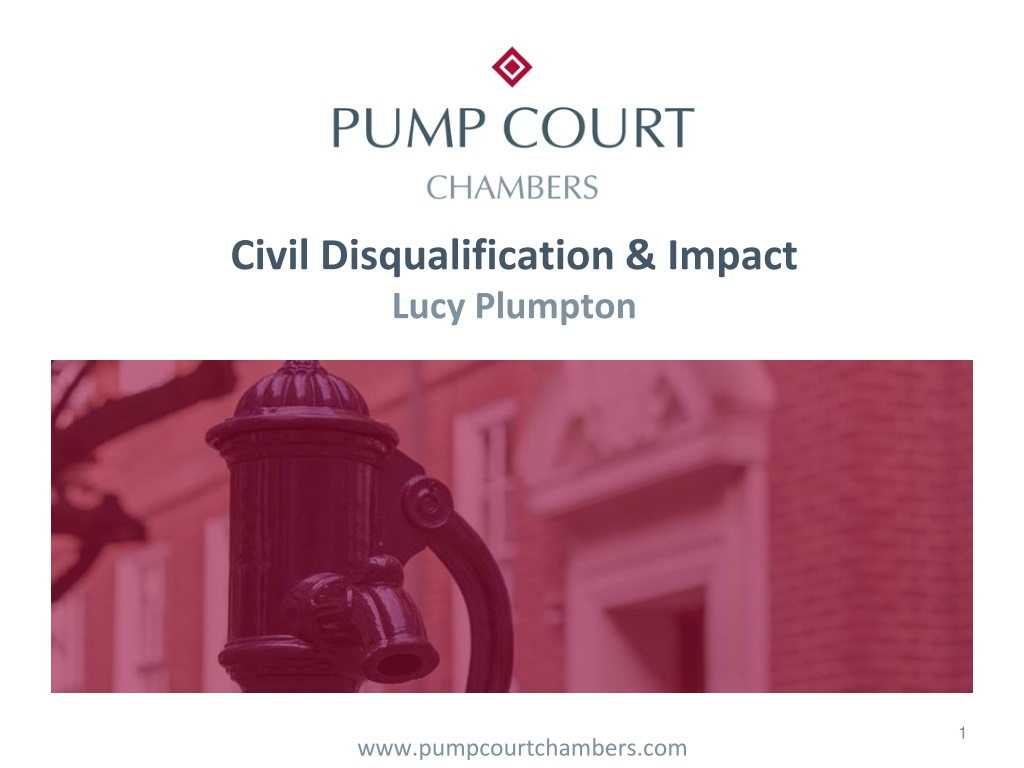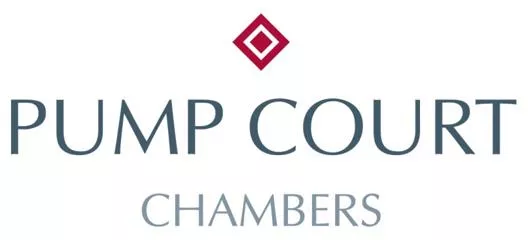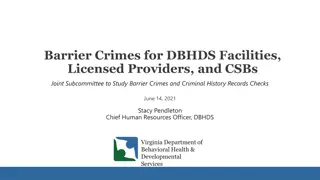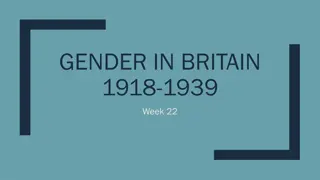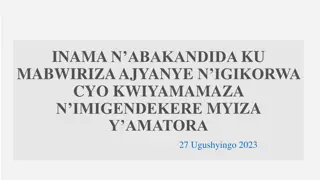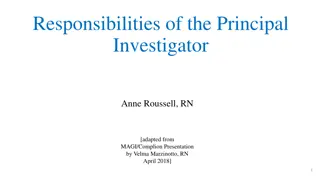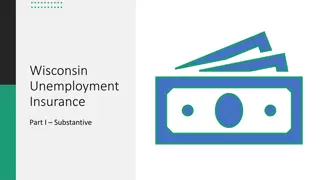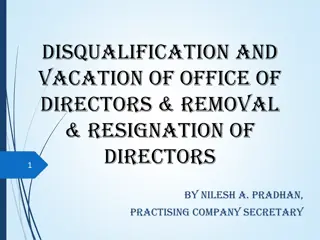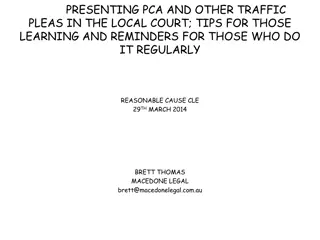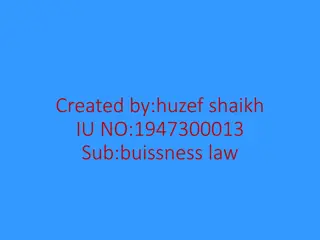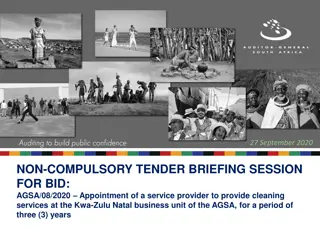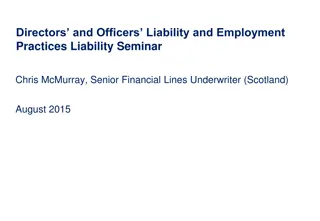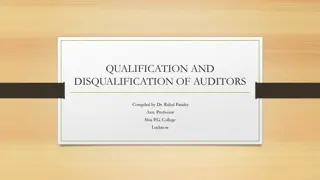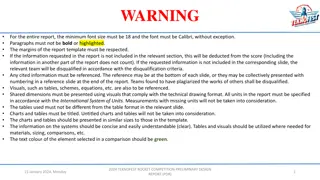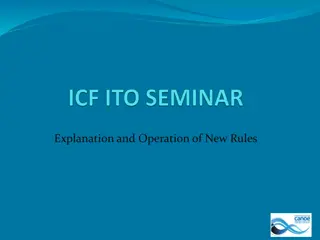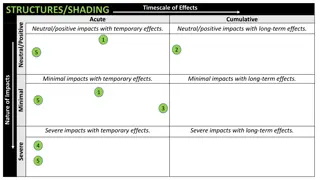Understanding Director Disqualification and Its Impacts
Directors can become disqualified through personal insolvency or involvement in an insolvent company. Disqualification orders can be imposed by the court under specific circumstances, making the individual unfit to be involved in managing a company. The Insolvency Service plays a key role in investigating directors' conduct in such situations, potentially leading to disqualification actions.
Download Presentation

Please find below an Image/Link to download the presentation.
The content on the website is provided AS IS for your information and personal use only. It may not be sold, licensed, or shared on other websites without obtaining consent from the author. Download presentation by click this link. If you encounter any issues during the download, it is possible that the publisher has removed the file from their server.
E N D
Presentation Transcript
Civil Disqualification & Impact Lucy Plumpton 1 www.pumpcourtchambers.com
Content Two key ways in which directors become disqualified Personal insolvency Insolvent company - unfit Disqualification proceedings, orders and undertakings What disqualification means for directors 2
(A) Personal insolvency Where a director (D) is declared bankrupt, disqualification is automatic under s.11 CDDA 1986. D is automatically disqualified from acting as a director of a limited company, or as a partner of a Limited Liability Partnership (as well as some other types of organisations). The court may additionally impose a bankruptcy restrictions order to extend disqualification beyond the period of undischarged bankruptcy. 3
(B) Insolvent company / Unfit s.6 Company Directors Disqualification Act 1986 (1) The court shallmake a disqualification order against a person in any case where (a)the court is satisfied (i) that the person is or has been a director of a company which has at any time become insolvent (whether while the person was a director or subsequently), or (ii) that the person has been a director of a company which has at any time been dissolved without becoming insolvent (whether while the person was a director or subsequently), and (b) the court is satisfied that the person's conduct as a director of that company (either taken alone or taken together with the person's conduct as a director of one or more other companies or overseas companies) makes the person unfit to be concerned in the management of a company. 4
s.6 summarised A disqualification order (DO) under s.6 must be made against a director or shadow director of a company that becomes insolvent, if that person s conduct as a director makes that person unfit to be concerned in the management of a company. 5
Insolvency Service Whenever a company goes into administration or liquidation, the insolvency practitioner (administrator / liquidator) has an obligation to submit a confidential report to the Insolvency Service on the directors conduct. The Insolvency Service s investigation will lead to it deciding whether or not to seek to disqualify the director/s. 6
Insolvency Service Best to engage early in the investigation phase. Check insurance cover for legal costs. 7
Insolvency Service If the Insolvency Service decides that a director should be disqualified, they issue a section 16 letter : informing D of its decision outlining allegations of unfit conduct setting out the period of disqualification which the Insolvency Service considers appropriate inviting a disqualification undertaking (otherwise, they will issue proceedings) whether a compensation order will be sought. 8
Undertakings Under s.1A CDDA 1986, the SoS may accept a voluntary disqualification undertaking instead of initiating disqualification proceedings. Not paying court costs Potential discount on length SoS is not obliged to accept the undertaking is it expedient in the public interest to do so? Disqualification orders and undertakings attract the same consequences if breached. 9
Proceedings (i) In the name of the SoS for Business, Energy & Industrial Strategy voluntary winding up By the Official Receiver compulsory winding up A claim must be brought within three years of the day the company became insolvent s.7(2) CDDA Multi-track Must refer to PDDDA First hearing within 8 weeks of issue Uncontested claims at first hearing 10
Proceedings (ii) Contested claims The parties must take all possible steps to avoid successive directions hearings and to ensure the full disqualification hearing can take place at the earliest possible date. Evidence by affidavit or written report by first hearing if possible. First hearing directions to consider: disclosure, attendance for XX, ICCJ / DJ / HCJ, debarring, skeleton arguments, bundles. 11
Proceedings (iii) Implied exception to strict rules of evidence so as to enable the court to receive as evidence materials produced under statutory procedures, such as reports of investigators appointed by financial services regulators, affidavits of liquidators and officials of relevant government department agencies. Public interest. Court must consider Sch.1 factors in every case. 12
Proceedings (iii) DO may be made whether or not D appears/engages. para. 13 PDDDP: Any DO made in the absence of the Defendant may be set aside or varied by the court on such terms as it thinks just. s.1(2) CDDA 1986: a disqualification shall commence at the end of the period of 21 days from the date of the final order, unless the court orders otherwise. Appeal vs s.17 CDDA 1986. 13
Unfitness The question is whether the conduct specified and proven, in the context in which it occurred, fell below the standards of probity and competence appropriate for persons fit to be directors of companies. If it did, the director must be disqualified (even if D is no longer a danger to the public). 14
What is unfitness? breach of commercial morality reckless or grossly incompetent conduct continuing trading when co. cannot pay debts / to the detriment of HMRC or other creditors not paying tax fraudulent dealings does not have to involve proven breach of some legal duty 15
Length & compensation orders Disqualification orders must last between 2 15 years. The SoS may apply to court to make a compensation order D where his conduct has caused loss to one or more creditors of an insolvent company of which the person has at any time been a director: ss.15A 15C. The application must be made within two years of the disqualification order (or undertaking). 16
What it means for D stop CDDA 1986, s.1 The effect of a DO/U against D: D shall not, without leave of the court, be a director of a company or in any way, whether directly or indirectly, be concerned or take part in the promotion, formation or management of a company for a specified period beginning with the date of the order Also applies to LLPs D cannot be a receiver of a company s property D cannot act as an insolvency practitioner Stop acting as a director, by whatever name called Job title not a way out No instructing others to manage a company 17
Not just companies Limited liability partnerships (LLPs) General partnerships Building societies Incorporated friendly societies NHS foundation trusts Registered societies Charitable incorporated organisations Further education bodies Protected cell companies 18
What it means for D restrictions Wider ramifications: Charities Schools Pension trustees Police and police authorities Registered social landlords Health boards and social care bodies Solicitors, barrister, accountants and other professionals 19
What it means for D - publication The order or undertaking will be registered at Companies House Details of disqualification available from the Insolvency Service (3 months vs emailing CPT) 20
Questions? Thank you for listening! 23
